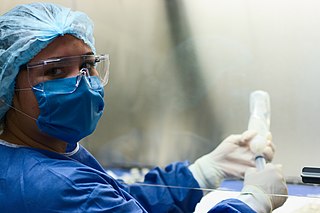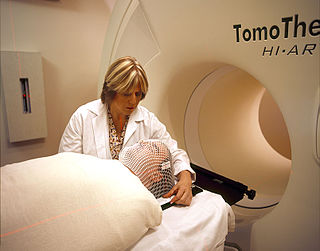Related Research Articles

A veterinarian (vet) is a medical professional who practices veterinary medicine. They manage a wide range of health conditions and injuries in non-human animals. Along with this, veterinarians also play a role in animal reproduction, health management, conservation, husbandry and breeding and preventive medicine like nutrition, vaccination and parasitic control as well as biosecurity and zoonotic disease surveillance and prevention.
A radiation oncologist is a specialist physician who uses ionizing radiation in the treatment of cancer. Radiation oncology is one of the three primary specialties, the other two being surgical and medical oncology, involved in the treatment of cancer. Radiation can be given as a curative modality, either alone or in combination with surgery and/or chemotherapy. It may also be used palliatively, to relieve symptoms in patients with incurable cancers. A radiation oncologist may also use radiation to treat some benign diseases, including benign tumors. In some countries, radiotherapy and chemotherapy are controlled by a single oncologist who is a "clinical oncologist". Radiation oncologists work closely with other physicians such as surgical oncologists, interventional radiologists, internal medicine subspecialists, and medical oncologists, as well as medical physicists and technicians as part of the multi-disciplinary cancer team. Radiation oncologists undergo four years of oncology-specific training whereas oncologists who deliver chemotherapy have two years of additional training in cancer care during fellowship after internal medicine residency in the United States.

An oncology nurse is a specialized nurse who cares for cancer patients. These nurses require advanced certifications and clinical experiences in oncology further than the typical baccalaureate nursing program provides. Oncology nursing care can be defined as meeting the various needs of oncology patients during the time of their disease including appropriate screenings and other preventive practices, symptom management, care to retain as much normal functioning as possible, and supportive measures upon end of life.
A veterinary specialist is a veterinarian who specializes in a clinical field of veterinary medicine.

Vaccination of dogs is the practice of animal vaccination applied to dogs. Programs in this field have contributed both to the health of dogs and to the public health. In countries where routine rabies vaccination of dogs is practiced, for example, rabies in humans is reduced to a very rare event.
North Carolina State University College of Veterinary Medicine is an American educational institution located in Raleigh, North Carolina that offers master's and doctorate-level degree programs; interdisciplinary research in a range of veterinary and comparative medicine topics through centers, institutes, programs and laboratories; and external engagement through public service programs and activities.
The Society of Gynecologic Oncology (SGO), headquartered in Chicago, Illinois, is the premier medical specialty society for health care professionals trained in the comprehensive management of gynecologic cancers, affecting the uterus, fallopian tubes, ovaries, cervix, vagina, and vulva. As a 501(c)(6) organization, the SGO contributes to the advancement of women’s cancer care by encouraging research, providing education, raising standards of practice, advocating for patients and members and collaborating with other domestic and international organizations.
Soft tissue sarcoma refers to a broad group of tumors that originate from connective tissues. They tend to have similar histologic appearance and biological behavior, and can be either benign or malignant. Soft tissue sarcomas can arise in any part of the pet's body but skin and subcutaneous tumors are the most commonly observed. Soft-tissue sarcomas comprise approximately 15% of all skin and subcutaneous tumors in dogs and approximately 7% of all skin and subcutaneous tumors in cats. The variety of different tumors that fall under the category of soft tissue sarcomas includes fibrosarcoma, hemangiopericytoma, liposarcoma, rhabdomyosarcoma, leiomyosarcoma, malignant fibrous histiocytoma, malignant nerve sheath tumors, myxosarcoma, myxofibrosarcoma, mesenchymoma, and spindle cell tumor.

Cancer is the leading cause of death in dogs. It is estimated that 1 in 3 domestic dogs will develop cancer, which is the same incidence of cancer among humans. Dogs can develop a variety of cancers and most are very similar to those found in humans. Dogs can develop carcinomas of epithelial cells and organs, sarcomas of connective tissues and bones, and lymphomas or leukemias of the circulatory system. Selective breeding of dogs has led certain pure-bred breeds to be at high-risk for specific kinds of cancer.
Many types of skin tumors, both benign (noncancerous) and malignant (cancerous), exist in cats and dogs. Approximately 20–40% of primary skin tumors are malignant in dogs and 50–65% are malignant in cats. Not all forms of skin cancer in cats and dogs are caused by sun exposure, but it can happen occasionally. On dogs, the nose and pads of the feet contain sensitive skin and no fur to protect from the sun. Also, cats and dogs with thin or light-colored coats are at a higher risk of sun damage over their entire bodies.

Oncology is a branch of medicine that deals with the study, treatment, diagnosis and prevention of tumors. A medical professional who practices oncology is an oncologist. The name's etymological origin is the Greek word ὄγκος (ónkos), meaning "tumor", "volume" or "mass". Oncology is concerned with:

McLaren Flint is a nonprofit, 378 bed tertiary teaching hospital located in Flint, Michigan. McLaren is affiliated with the Michigan State University College of Human Medicine's medical residency programs, including family medicine, internal medicine, general surgery, orthopedic surgery and radiology. McLaren also maintains a hematology/oncology fellowship program in partnership with Michigan State University and is sponsoring a surgical oncology fellowship program. McLaren Flint is a subsidiary of McLaren Health Care Corporation.

Physical therapy for canines adapts human physical therapy techniques to increase function and mobility of joints and muscles in animals. Animal rehabilitation can reduce pain and enhance recovery from injury, surgery, degenerative diseases, age-related diseases, and obesity.

Cancer can be treated by surgery, chemotherapy, radiation therapy, hormonal therapy, targeted therapy and synthetic lethality, most commonly as a series of separate treatments. The choice of therapy depends upon the location and grade of the tumor and the stage of the disease, as well as the general state of the patient. Cancer genome sequencing helps in determining which cancer the patient exactly has for determining the best therapy for the cancer. A number of experimental cancer treatments are also under development. Under current estimates, two in five people will have cancer at some point in their lifetime.

Adventist HealthCare White Oak Medical Center is a hospital with 180 private patient rooms and serves patients in Montgomery, Prince George's, and surrounding counties.

Veterinary medicine in the United States is the performance of veterinary medicine in the United States, normally performed by licensed professionals, and subject to provisions of statute law which vary by state. Veterinary medicine is normally led by veterinary physicians, termed veterinarians or vets, but also by paraveterinary workers, such as veterinary technicians, and veterinary assistants. This can be augmented by other paraprofessionals with specific specialties, such as animal physiotherapy or dentistry, and species-relevant roles such as farriers.
David F. Levine is an American author, a professor of physical therapy, and a biomedical scientist. He holds the Walter M. Cline Chair of Excellence in Physical Therapy at the University of Tennessee at Chattanooga. His research and publication contributions focus on veterinary rehabilitation and physical therapy, including canine physical therapy, animal assisted therapy, gait analysis and motion analysis, the use of modalities such as extracorporeal shockwave therapy, electrical stimulation, and therapeutic ultrasound, as well as clinical infectious disease research and Ehlers-Danlos Syndrome research.

Northern Westchester Hospital (NWH), now known as Northwell Health, is a not-for-profit, 245-bed, all-private-room facility in Mount Kisco, New York. Founded in 1916, it serves residents of Northern Westchester, Putnam County and southern Dutchess County, as well as parts of Fairfield County, Connecticut.
Anne Louise Rosenberg is an American surgical oncologist retired from practice in Cherry Hill, New Jersey.
David Argyle BVMS DECVIM-CA (Oncology) FRSE FRSA FRCVS is Head of the College of Medicine and Veterinary Medicine at the University of Edinburgh.
References
- ↑ UPI, October 25, 1982, published in the Pittsburgh Press
- ↑ Robert Rooks, Connie Janowski, and Suzanna Lee, Canine Orthopedics, Howell Books, 1997, ISBN 978-0-87605-720-9
- ↑ Barbara Kitchell, Susan M. Larue, and Robert Rooks, Veterinary Cancer Therapy Handbook: Chemotherapy, Radiation Therapy, and Surgical Oncology for the Practicing Veterinarian, 2nd edition, American Animal Hospital Association, 2000, ISBN 978-1-58326-008-1